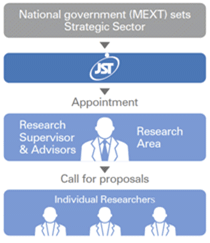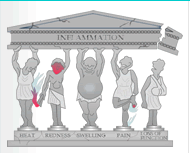About this page
This page aims to introduce current studies that involve elucidation of mechanisms of chronic inflammation relating to the malignant alteration of various diseases, and to promote advanced medical care in this context.
Research areas of "Core Research for Evolutional Science and Technology" (CREST) and "Precursory Research for Embryonic Science and Technology" (PRESTO) relating to chronic inflammation
"CREST" and "PRESTO" are basic research promotion funding programs conducted by Japan Science and Technology Agency (JST), which is an independent public body of the Ministry of Education, Culture, Sports, Science and Technology (MEXT). MEXT plays a key role in implementing science and technology policies formulated in line with the nation's Science and Technology Basic Plan. In conjunction with independent research, these programs also operate synergistically in collaboration with each other. In 2010, JST launched a new research initiative incorporating both the “Creation of basic medical technologies to clarify and control the mechanisms underlying chronic inflammation" (CREST) and the "Elucidation and control of the mechanisms underlying chronic inflammation" (PRESTO) research programs.
Basis of JST’s funding programs
The Basic Research Programs constitute JST's major undertaking to promote fundamental research on top-down methods towards accomplishing goals pertaining to the nation's strategic sectors. These funding programs aim to produce technological seeds that will contribute to reformation of industries and society. Front-line researchers at universities and public and private institutes join these programs by forming a temporary inter-institute research consortium as required. CREST and PRESTO are the main funding programs initiated by the JST in this regard.
1. CREST

Pursuing Team-Oriented Research that Strives to Generate High-Impact Seeds of Innovation JST establishes the Research Areas based on the strategic sectors set by the national government (the Ministry of Education, Culture, Sports, Science and Technology: MEXT). JST appoints a “Research Supervisor” who leads each Research Area as a top of a "Virtual Institute". JST calls for proposals in each Research Area and the Research Supervisors select research projects and manage the Research Areas by taking any possible steps such as to coordinate the research plans (including research funding and research team composition), to exchange opinions with Research Directors, to provide advice on research, to evaluate projects and so on. CREST is a team-oriented research program that aims to generate breakthroughs that will have a significant impact on the development of science and technology and provide tangible benefits to the society.
2. PRESTO (Sakigake)

Promoting Individual Research to Nurture the Seeds of Future Innovation JST selects the Research Areas it will promote in line with the Strategic Sectors set by MEXT. In this targeted basic research program, research proposals are selected after a call for proposals. Under the management of a Research Supervisor, individual researchers pursue independent research while receiving advice from their Research Supervisor and Research Area Advisor, and researchers from the same Research Areas receive opportunities to interact with other researchers from a variety of institutions and backgrounds, thereby encouraging cross-pollination of research ideas.
¥30–40million (per person)
Five years: Average total of approximately
¥50–100 million (per person)
Basis of the “Chronic inflammation” research areas
The national science and technology policy, that is, the "Promotion of Research and Development of Innovative Pharmaceuticals and Medical and Nursing Care Technologies from Japan" has been stated in Chapter 3 (Health Power Strategy through Life Innovation) of "The New Growth Strategy (Basic Policies)," which was approved by the Cabinet in 2009. On the basis of this policy, MEXT designated "Creation of basic medical technologies for the prevention, diagnosis and treatment of cancer, arteriosclerotic diseases, and autoimmune disorders by the elucidation of the mechanisms underlying chronic inflammation" as a strategic sector.
The JST included the research areas "Creation of basic medical technologies to clarify and control the mechanisms underlying chronic inflammation" in the CREST program and "Elucidation and control of the mechanisms underlying chronic inflammation" in the PRESTO program based on the strategic sectors. A responsible research supervisor was appointed for each research area in 2010. Dr. Masayuki Miyasaka (Professor, Osaka University) is the research supervisor of the CREST program, and Dr. Kiyoshi Takatsu (Director, Toyama Prefectural Institute for Pharmaceutical Research) is the Research Supervisor of the PRESTO program.
Superior research proposals in line with the strategic sectors were carefully selected from proposals obtained via public advertisements, and the projects pertaining to the selected proposals have been implemented since FY 2010.
By implementing projects involving a variety of challenging research areas, we aim to develop innovative medical technologies while cultivating an increasing number of researchers as core leaders in chronic inflammation research in our country as well as deepening our understanding of chronic inflammation.



